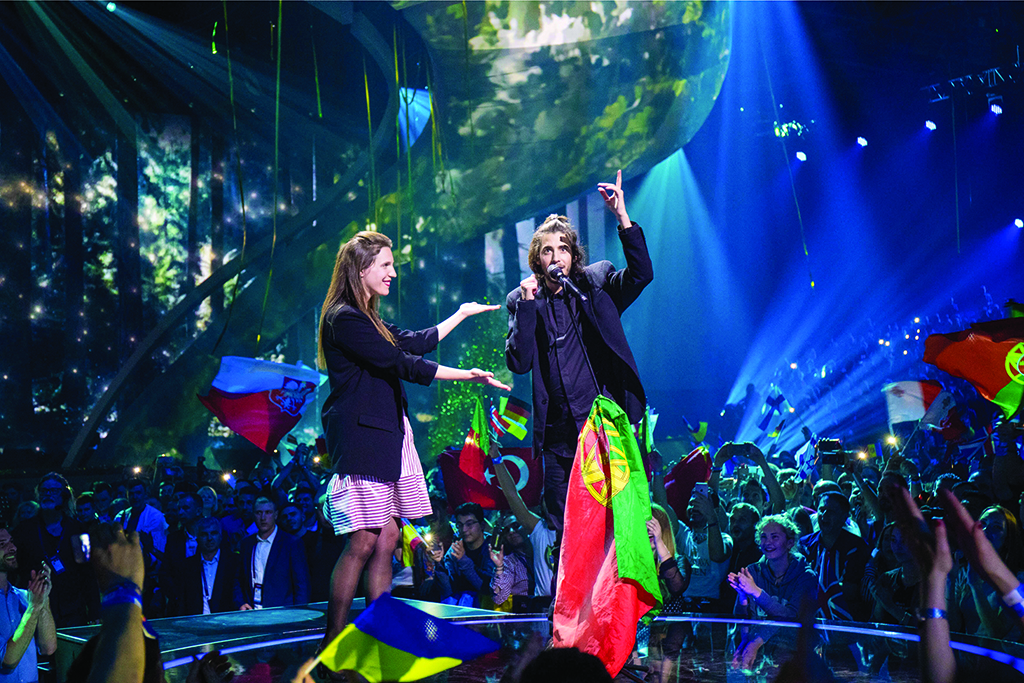Portugal gears up to host Eurovision for first time
The cost of organising an event like the Eurovision Song Contest has received much media attention in Portugal. Essential Business spoke to the ‘crew’ behind Eurovision Lisboa 2018, whose slogan is “All Aboard!”, and found out how they are keeping the boat afloat and on course.
Winning the Eurovision Song Contest is both a curse and a dream come true. This is how RTP director Cristina Vaz Tomé described Portugal’s victory last year in Ukraine’s capital city Kiev.
“It’s a curse winning Eurovision, isn’t it? I mean the costs involved,” jokes Cristina Vaz Tomé. “I told my fellow European Broadcasting members that I wasn’t worried that we (Portugal) had been trying for 50 years and had never won. Then we did, and now we have to host it!”
It’s also a dream come true. “For many years, Portugal had ambitions to win Eurovision. At RTP, we have a certain fondness for the event; it’s exciting and it’s not like we haven’t had the experience hosting world-class events,” she adds, referring to UEFA Cup 2004.
Lisbon’s top political figures are enthusiastic, too. “It’s excellent for Lisbon,” says Ana Mendes Godinho, Secretary of State for Tourism. “In terms of exposure and promotional value, it’s very positive. The attention the country will receive is important. There is no doubt that Lisbon must take advantage of this event and, from what we have seen so far from ticket sales and social media, the interest is huge,” she adds.
Lisbon mayor Fernando Medina echoes the importance of the event on the local economy and in terms of inter- national projection. “We are talking about one of the largest international televised events, with over 200 million viewers. The focus will be on Lisbon for 10 days with abundant coverage in the lead up to the event and for weeks after.
“Accreditation requests from foreign journalists are already three times what we had expected with applications coming from over 4,000 entities,” says the mayor.

Salvador Sobral and his sister and writer of his winning song, Luisa Sobral, at Eurovision 2017
RTP’s Cristina Vaz Tomé agrees: “The long-term benefits from international exposure are immense. We are also hosting a number of parallel events, in association with the Lisbon City Hall, Turismo de Portugal and Turismo de Lisboa.”
RTP estimates that the Eurovision Song Contest Lisboa will cost around €13 million-€15 million. “It will likely be the most cost-efficient Eurovision contest in the past decade,” said Cristina Vaz Tomé.
One-third of the financing comes from Eurovision itself through the Public Service Media (PSM) – the national broadcasters who are members of the European Broadcast Union (EBU) – the other third from ticketing and the remainder from sponsorship, both international and local.
“At the moment, the weight is in favour of receipts rather than ticketing (€3.5 million-€4 million) – and I’m not including the €5 million (tourist tax revenue) input from Lisbon City Hall -, which will pay for the cost of hiring the Altice Arena (estimated 33,000 spectators on May 8, 10 and 12), the Eurovision Village in Terreiro do Paço and the parallel events.”
According to the Eurovision blog Wiwibloggs, Kiev spent around €2 million on lighting and €3 million on combined stage, projection and TV feed production in 2017. The problem RTP and its partners are facing is not the organisation of putting on the world’s biggest annual musical event, nor the technical and creative ability to stage it. The challenge seems to be finding the cash. Negotiations over funding and the division of costs have been ongoing. Some Eurovision host countries have been known to spend far in excess of €35 million. Azerbaijan spent €48 million after building the brand-new Baku Crystal Hall for the show.
Copenhagen forked out €36 million and Vienna €28 million. Even Kiev, with its known financial problems, spent €30 million. And then there is the cost of making the presentation ‘postcards’ – the short vignettes with the 42 contestants filmed in different locations in Portugal, including Madeira and the Azores. Kiev spent €77,000 last year. This is not to mention the costs of the custom-made designer outfits the four female hosts – Catarina Furtado, Daniela Ruah, Sílvia Alberto and Filomena Cautela – will wear. In Kiev, wardrobe expenses were an eye-watering €38,000. On these costs, RTP remained tight-lipped.

Eurovision presenters Filomena Cautela, Sílvia Alberto, Daniela Ruah and Catarina Furtado (From left to right)
HUGE RESPONSIBILITY
As one of the ambassadors and hosts of the Eurovision Song Contest Lisboa 2018, Filomena Cautela says it will be a “huge responsibility” to present the show.
“I thought it was a joke when they told me I was presenting it. I have a reputation for being natural, out-of-the- box and with the ability to surprise people, so I hope I can provide a touch of humour and a down-to-earth attitude. My fellow presenters will bring the glamour to the show!”
If the costs are onerous, Eurovision isn’t mentioning it. Jon Ola Sand, the European Broadcast Union’s executive supervisor of the Eurovision Song Contest (ESC), said: “RTP’s team has been on top of their tasks from day one. The work has been well coordinated, efficient and professional. The team is friendly, relaxed and highly committed to deliver this year’s ESC to the highest standard. We have managed to resolve all the challenges in this enormously complex project in a respectful and professional manner.”
As to the budget, an EBU spokes- person says, “We are very satisfied with the budgets that have been presented to us by RTP, and preparations are progressing well. The EBU have had great cooperation with the host broadcaster so far and have full confidence in them to produce an excellent Eurovision Song Contest in May.”
Jonathan Moles, a well-known member of the UK’s Eurovision “intelligentsia” says: “I think Portugal will put on a great show. As the show has grown over the years, with 42 entries now taking part and the technology more advanced, the question is whether broadcasters in small European countries can spend such huge amounts of money.
“I think Portugal is getting things right. Rich countries like Sweden, which hosted ESC several times, have nothing to prove and can have fun with it. Too often, poorer countries like the Ukraine feel they have something to prove. Of course, Portugal wants to show itself off but isn’t desperate. It got Lisbon City Hall and the Portuguese tourism board on side early on and so the funding seems to be more evenly shared. It has accepted outside help where useful (Swedish television, for example) and it has the infrastructure (the Altice Arena and many hotels to choose from),” concludes Moles.
CHALLENGE ON A BUDGET
The president of Sociedade Portuguesa de Autores (Portuguese Society of Authors), Tozé Brito, who himself represented Portugal in 1972 with “Se Quiseres Ouvir Cantar” and produced the Eurovision entry for Portuguese female band ‘Doce’ in 1982 (“Bem Bom”), believes that, in terms of visibility, this event is crucial for Portugal.
“When Spain won Eurovision in 1968 and again in 1969, it had a dramatic impact on tourism. For Portugal, hosting the show can only boost visitor numbers and Portugal’s image in the world.”
Nuno Galopim, music journalist and jury member for the national contest Festival da Canção, which picks Portugal’s entry for Eurovision, reflects: “What happened last year in Kiev was unexpected. A magical one-off moment. But it was also the result of team effort, after signing up to the challenge of revitalising the song contest locally and selecting songs that were about the music rather than the glitz, glamour and fireworks.”
Gonçalo Madail, Eurovision 2018 artistic director, agrees: “This is a big challenge for us. We don’t have the financial resources that some countries have, but we have taken that as a challenge and opportunity to focus on the music. We are going to do this smartly, artistically and on budget. We don’t have to spend €30 million to put on a great show.”









